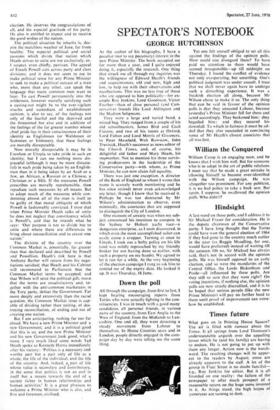SPECTATOR'S NOTEBOOK
GEORGE HUTCHINSON
As the author of his biography, I have a peculiar (not to say pecuniary) interest in the new Prime Minister. The book occupied me for more than a year, and I quite enjoyed doing it, especially the research. One thing that struck me all through my inquiries was the willingness of Edward Heath's friends and acquaintances, old and new, high and low, to help me with their observations and recollections. This was no less true of those who are opposed to him politically—for ex- ample Roy Jenkins, Lord Goodman, Victor Feather—than of close personal (and Con- servative) friends like Lord Aldington and the Madron Seligmans.
They were a large and varied band, a mixed bag. They ranged from a couple of his old schoolmasters, James Bird and Cecil Curzon, and two of his tutors at Oxford, Lord Fulton and Lord Morris of Grasmere, to Peter Masefield, Walt Rowstow, John Trevisick, Heath's successor as news editor of the Church Times, and, of course, his delightful old father and Mary Heath, his stepmother. Not to mention his three surviv- ing predecessors in the leadership of the Conservative party—with whom, as Prime Minister, he can now claim full equality.
There was just one exception. A director of the Bank of England to whom I wrote (his name is scarcely worth mentioning and he has since retired) never even acknowledged my letter, though I know that he received it. Perhaps he was too distracted by Mr Wilson's administration to observe, even minimally, the courtesies that are supposed to distinguish the City of London.
One moment of anxiety was when my sub- ject announced his intention to compete in the Sydney to Hobart yacht race—a dangerous enterprise, as I soon discovered, in which even the most accomplished sailor can easily come a cropper. Turning at once to Lloyds, I took out a hefty policy on his life (and was mildly reproached by my friendly broker for not having done so earlier, with such a property on my hands). We agreed to let it run for a while. At the very beginning of the election campaign I rang to ask him to remind me of the expiry date. He looked it up. It was Thursday, 18 June.
Down the poll
All through the campaign, from first to last, I kept heiring encouraging reports from Tories who were actually fighting in the con- stituencies. I was in touch with a good many candidates, all personal friends, in various parts of the country, from East Anglia to the West of England, from the Midlands to Lan- cashire. One and all, they were detecting a steady movement from Labour to themselves. In Home Counties seats and in London, people directly engaged in the cam- paign day by day were telling me the same thing. Yet one felt oneself obliged to set all this against the findings of the opinion polls. How could one disregard them? To have paid no attention to them would have seemed irresponsible—up till midnight on Thursday. I found the conflict of evidence not only exasperating, but unsettling. One's political judgment was under assault. I /rust that we shall never again have to undergo such a disturbing experience. It was a freakish election all along, because Mr Wilson chose to make it so. The only thing that can be said in favour of the opinion polls is that they unseated Labour, because yesterday's Prime Minister fell for them and acted accordingly. They beckoned him: they beguiled him: and they secured his downfall. To which in fairness it must be ad- ded that they also succeeded in convincing some of Mr Heath's closest associates that all was lost.
William the Conquered
William Camp is an engaging man, and he knows that I wish him well. But for someone who is so adept in the art of public relations I must say that he made a great mistake in allowing himself to become over-identified with the Wilson campaign. He was altogether too prominent. For any publicist, it is no bad policy to take a back seat. But again, I suppose, he swallowed the opinion polls. Who didn't?
Hindsight
A last word on those polls, and I address it to Sir Michael Fraser for consideration. He is the deputy chairman of the Conservative party. I have long thought that the Tories could have won the general election of 1964 if they had gone to the country much earlier in the year (as Reggie Maudling, for one, would have preferred) instead of waiting till the autumn. Oh no, Sir Michael has always said, that's not in accord with the opinion polls. He was himself opposed to an early election, and so were the mandarins of the Central Office, the Lords Blakenham and Poole—all influenced by these polls. Are they still so sure that they were right? On voting intentions, if nothing else, the opinion polls are now utterly discredited, and it is to be hoped that serious people (like the new Prime Minister) will pay no further heed to them until proof of improvement can some- how be established.
Times future
What goes on in Printing House Square? The air is filled with rumour about the Times. It all springs from Lord Thomson's understandable anguish over the appalling losses which he (and his family) are having to endure. He is not going to put up with them any longer. Action now is the watch- word. The resulting changes will be appar- ent to the readers by August; some are already apparent to the staff. A lot of the gossip in Fleet Street is no doubt fanciful- e.g., Roy Jenkins for editor. But it is all founded on one reality: the failure of the newspaper to offer much prospect of a reasonable return on the huge sums invested in it. As things stand, the high hopes of yesteryear are turning to dust.






























 Previous page
Previous page